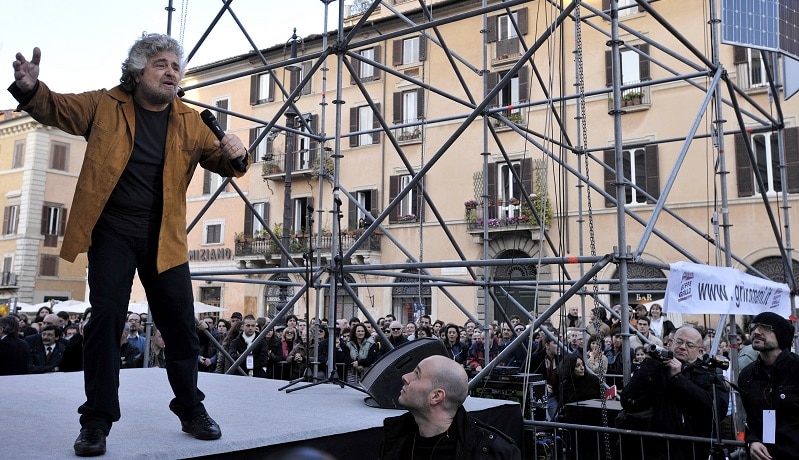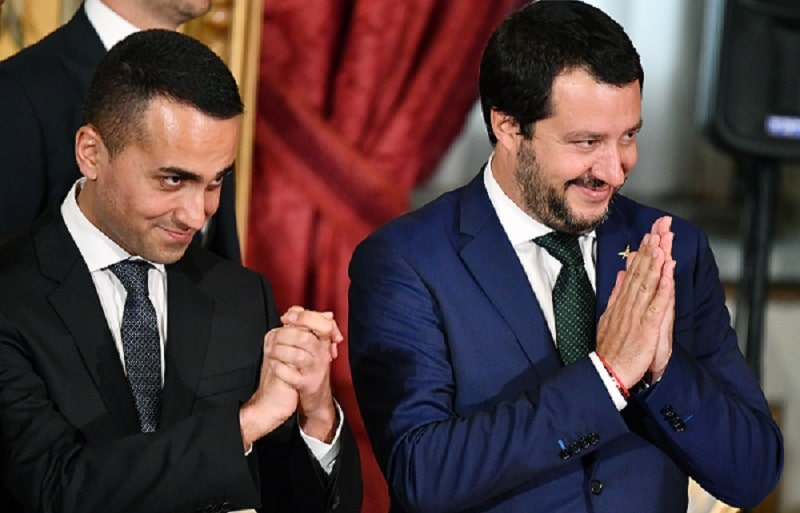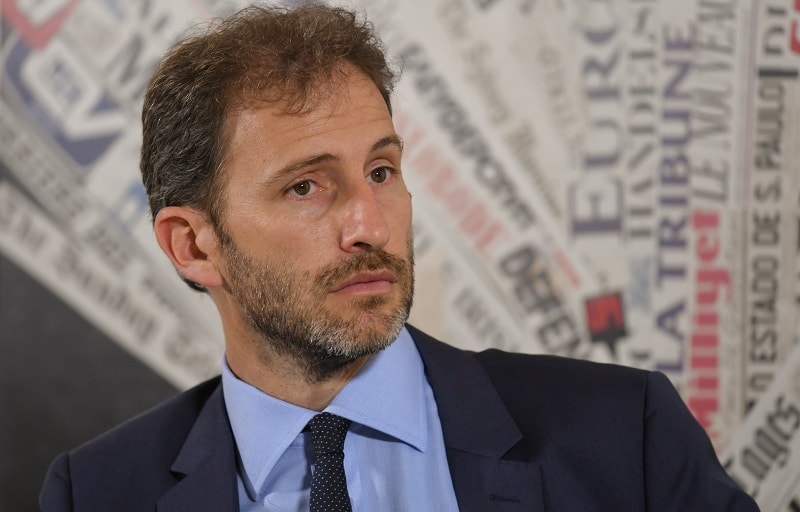«Sign up here! Help us stop the incinerator!» On a lazy Saturday morning in Milan, ladies busy with their shopping and young couples look uncertainly at the gazebo set up by the Five Stars Movement (M5S), Italy’s first party in Parliament, to promote a local environmental campaign. Just across the street is another political stand, that of Forza Italia, former prime minister Silvio Berlusconi’s once glorious party. «Those are the mafia», says bitterly one of the M5S activists.
Two years after triumphing in national elections, the Movement is battling for political survival. Rage against the “old” mainstream parties which had ruled Italy for most of the 90s and the 2000s, center-right Forza Italia and center-left Democratic Party (PD) chiefly, was indeed the fuel which made the grassroots, anti-establishment Five Stars boom in national politics since 2013. On March 4th 2018, after five years of staunch parliamentary opposition to “forced” coalition governments between the PD and center-right moderates, they stormed all competitors gathering as much as a third of nation-wide ballots. In some of Italy’s regions, particularly in the poorer South, M5S fared well above 40%, getting close to winning half of all votes in Sicily. To activists and political observers alike, it became clear the entry of the Movement into national office could not be delayed any longer.
Less than a year after forming its first government with the far-right League, on the May 2019 European elections, the share of the M5S vote had already plunged to 17,1%. A traumatic halving of electoral support which almost entirely benefitted its new ally, Matteo Salvini. Thanks to hardcore rhetoric and political actions to stop migrants from reaching Italy’s shores, his League climbed its way up to 34,3% of votes, doubling its consensus within a year. A troubled change of majority a few months later, caused by Mr. Salvini’s decision to bring down the government in a bid to force a snap election, was no better cure for M5S’s pain. The sudden alliance with the old enemies of PD, on the contrary, hurt them further in electoral terms. According to the latest opinion polls, the Movement would now gather as little as 14% of votes. In the several regions where citizens were actually called to the ballot, the results were far more depressing: running in coalition with the PD, it collected just over 7% in Umbria last October. A return to an “independent” local strategy in two other regions did not fare any better: in late January, the Movement was punished bitterly in both center-north Emilia Romagna (4,7%) and Calabria in the south (6,2%).
Worst of all, the much-anticipated results led to the collapse the leadership of Mr. Luigi Di Maio, the 33-year-old Minister for Foreign Affairs who had been appointed as “political chief” of the Movement since September 2017. Amidst open war between new aspiring leaders and an increasing outflow of MPs towards other groups, a transition phase governed by Vito Crimi – a long-time, uncharismatic activist and MP – should now lead to M5S’ first de-facto congress, the so-called “Stati Generali” planned for spring. The exact date and place where these should take place remain so far unclear. Whether or not the get-together can bring any clarity to the progression of the project, however, a crucial question is already on the table for any international observer: how could a force with such strong electoral backing fall apart so dramatically?

When anti-politics meets politics
«The Five Stars Movement was born as a political experiment», recalls Jacopo Iacoboni, one the first Italian journalists to cover the M5S and the author of a recent book which retraces its origins, L’Esperimento (Laterza, 2019). When the first local meet-ups were formed and the first public protests against Italy’s political elite were staged, back in 2007, the visible face, voice and body of the new political creature was that of Beppe Grillo, one of Italy’s most beloved (and hated) comedians. But the real mind who conceived the experiment, stresses Iacoboni, was that of Gianroberto Casaleggio, the taciturn Piedmontese businessman who saw the potential of digital technologies to “refresh” democracy. «He bet on the power of Internet-enhanced networks to manipulate electoral consensus. Then came the growingly anti-élite, anti-Europe tones» of the campaign designed to launch the new political “product”. It is this weird, “dual tutorship” which brought the Movement to such unexpected, spectacular heights. And yet, some of the founding ingredients would also prove the basis for all its subsequent troubles.
The M5S has been «the most interesting political experiment internationally» in recent years, agrees Fabio Bordignon, a professor of Political Science at the University of Urbino who has long studied it. Scholars have often referred to it as an “anti-party”; yet its model was so innovative because it was a new hybrid, he claims. A bizarre mix-up of a horizontal, a-hierarchical structure typical of old-style grassroots movements with two other neglected, but core features: the spectacularizing of its politics under the charismatic leadership of a highly “mediatic” personality; and the background role played by a private company – the Casaleggio Associati which developed and managed its essential digital infrastructure. Precisely two of the same defining features, Bordignon notes, of Silvio Berlusconi’s Forza Italia: the essence of all that the Movement claimed to be fighting.
For all the ostracism of the mainstream Italian media, which gave little attention to Grillo and Casaleggio’s project for long months since its founding, and later turned to cover it in mostly diabolic terms, that cocktail was precisely the recipe that lured millions of Italian voters. Building on the rage towards a perceived corrupt Italian political class and presenting itself as working for the “Five Stars” of water, environment, transportation, connectivity, and development, the Movement could indeed speak to everybody: young voters and disillusioned pensioners, Southerners struggling for employment or Northerners exhausted by the fiscal burden. Former voters, most importantly, of both the right and the left, which the M5S narrative claimed were largely outdated categories.
Italy’s first modern catch-all party, in short, was born. Not just in its intentions, Prof. Bordignon notes, but in its very outcomes. Since the 2013 national elections, the M5S was in fact able to intercept a highly composite constituency: according to the analysis of electoral flows, roughly a third of its votes came from the center-right, a third from the center-left, and a third from previously abstaining or highly uncertain voters.
Managing expectations
This all-encompassing, highly successful narrative was intimately related to a few key rules that the Movement had given itself since the beginning in order to ensure it would never become “a party like the others”. Firstly, the refusal to accept within its ranks – and most certainly within its electoral lists – anyone with past experience in office for other parties. In the very words of its leadership, “competence” on any specific topic was not to be regarded as a particularly desirable pre-requisite for any appointment – rather, indeed, as a suspect sign of possibly belonging to the élite. The new essential value to be embodied would be, simply but uncompromisingly, “honesty”. Second, and even more importantly, the refusal to enter into an alliance with any other party, at any level of government. Third and last, to avoid turning its elected “citizens” temporarily in office into professional politicians, any M5S representative would be barred from running more than twice in any election.
As some observers signaled, but many insiders refused to see, the Movement was building its own prison. If the 2013 result (25,5%) left its leadership room to claim a victory (the Five Stars actually got a few dozen thousands votes more than the PD) while remaining out of government, the 2018 outcome left in fact the M5S with no choice but to enter into cross-party negotiations to take a central role in the new executive as mandated by the vote. The very realization of their long-held ambition, in other words, was in itself the start of the destruction of M5S’ own taboos.

The killing factor(s)
Running a highly-indebted country with continuous industrial crises, a dysfunctional labor market and fragile international and financial credibility having a crowd of young, unexperienced activists overseeing the key ministries was to put under immediate strain the original rejection of the notions of competence or expertise. At the Milan gazebo, even some of its activists admit they now recognize that original sin. As the complexity of many dossiers became clear, some of the historic flagship battles heralded by the M5S, often related to local environmental causes fought by its original meet-ups, soon proved simply impossible to win once in government: thus was the case, for instance, with the rejection of key infrastructural projects such as the Turin-Lyon high-speed railway (TAV), or the Trans-Adriatic Pipeline in Apulia.
For all the similarities between their two programs, however, forming a government with the League was to prove a particularly painful test for one other key reason that would soon emerge: Salvini and the rest of its leadership were stubbornly committed to maintain their strong anti-system charge even once in power. That automatically condemned the M5S to play the “embarrassing” role of the incumbent. «The remarkable process of institutionalization it went through proved devastating for a Movement born with such great anti-system tension», notes Prof. Bordignon. «And the second, subsequent alliance with the PD, a party which has represented power for the last decade, has done even greater damage».
To its own voters or MPs, in short, the uncertainty and zigzagging of the Movement’s strategy after conquering power was puzzling. This seems to point to another, crucial limit of the creature’s core engine: its dependence on its “founding fathers”. «The real decline of M5S started earlier, when Casaleggio passed away in April 2016. It was as if the toy remained without its inventor», argues Iacoboni referring to the death of the businessman after a disease. The control of the company, and therefore of a crucial stake in the Movement, then passed on to his son, Davide. «But the young heir viewed the M5S rather as an instrument of political-economic relations, with no real political strategy».
The passing of the ideologue also accelerated another drift already at play: the estrangement from the Movement of the other co-founder, Beppe Grillo. Unwilling to play any “stable” political role, he had long harbored a sense of frustration with the hurdles of parliamentary politics and of nostalgia of the “pure” adrenalin of comedic showmanship. His cold relationship with his new project partner, Casaleggio jr., only added to his temptation to get back to his real job. After proclaiming Mr. Di Maio as the political chief of M5S in September 2017, he turned that aspiration into action. In January 2018, just months ahead of the new elections, he revealed he was taking a step back: while remaining the formal “guarantor” of the Movement, he was pushing it out of his own blog, beppegrillo.it, which had been one of Italy’s most visited websites and a key channel for M5S propaganda since its birth. By reclaiming his own platform, he announced he would mostly return to his original “core business”: performing in theaters across the country and stimulating thought and debate around visionary ideas for the future of society.
Coming into “adulthood”, independent of its two founding fathers, was a perspective that M5S activists had long seen as the natural denouement, one day. For all of the efforts that Di Maio put into the role of political leader (coupled with heavy ministerial responsibilities since June 2018), however, the bet was lost. Without its original tutors, and in the open sea of politics, the Movement imploded, in terms of electoral output as well as internal cohesion, and so did eventually his leadership.

Winners and losers
As the hour of reckoning of the “Stati Generali” nears, some speculate that Di Maio may actually have given up his prominent role only to prepare to relaunch of his own leadership. Others point to Alessandro Di Battista, a popular M5S figure who has remained out of Parliament and relatively on the sidelines these last two years, as the next would-be political head. Other candidacies, perhaps one of the party’s leading women, may emerge. Besides names, at stake will be the strategy to save the whole project: trying and playing the pivot role at the center of the country’s politics, consolidating its alliance with the PD, or getting back to its old, enraged opposition instinct? Whatever the outcome, the spectacular rise and fall of the Movement has already given enough material for thought.
One key lesson that any political players should learn, Prof. Bordignon reckons, is certainly that the Five Stars’ trajectory confirms the astonishing fluidity of electoral dynamics. As he’s written together with two other Italian political scientists, Luigi Ceccarini and Ilvo Diamanti, Italy seems to have accomplished its transition from “devout voting” to “liquid voting”. The performance of the M5S is not an outlier. The adventure of former prime minster Matteo Renzi just a couple of years earlier, after all, followed a broadly similar dynamic: “violent” aggression at the positions of governing élites; vertical ascension in polls; electoral boom; intense but brief honeymoon; downfall and marginalization. But such an instable political mood is by no means limited to Italy: the treatment that the French have reserved for their last presidents, and most strikingly for the current one, Emmanuel Macron, points to the very same trend.
Thinking that the diminished support for M5S means Italians have finally rejected its political project, however, may be naïve. «As a party, they are losing; but culturally, they have won», says again Iacoboni. After compelling the League to support some of its key flagship proposals, such as a €6,6 billion “citizenship income” scheme for poorer or unemployed Italians, its weight in government and in political discourse has also made its second partner, the PD, «slip towards populism, justicialism, welfarism and even some vein of nationalism», claims the journalist. «The virus that Grillo said he would inject into the Italian political system, in short, has eventually infected both the left and the right».
At the end of this month, if the much more serious virus which has meanwhile messed up the country’s daily politics does not force a delay, Italian voters will be called to cast their ballot to confirm a constitutional law passed by the Parliament last October which will cut the number of MPs by a third: another of the historic objectives of the M5S. None of the other main political parties, most of whom opposed the project when it was first presented in 2013, now dares to campaign against the cut. Is Grillo and Casaleggio’s dream dead, or alive and well?
Cover photo: Alberto Pizzoli / AFP
Follow us on Twitter, like our page on Facebook. And share our contents.
If you liked our analysis, stories, videos, dossier, sign up for our newsletter (twice a month).


